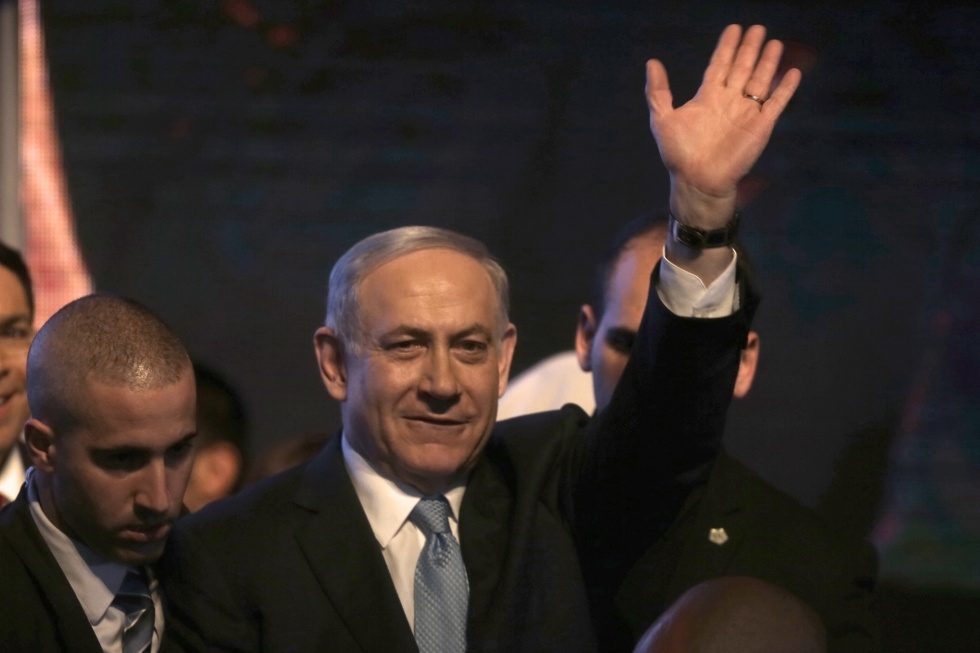ANALYSIS: Bibi’s victory has proved he is a ruthless political operator

It is difficult to describe Netanyahu’s victory in Tuesday’s elections as anything other than stunning. Stunning not so much for the fact that he had won - this much was reluctantly accepted among most observers. Even if he trailed Isaac Herzog in the number of seats he’d won, Netanyahu had many more natural allies in the Knesset than his opponent, and many more possibilities for composing a coalition. What was stunning was the sheer scope of Netanyahu’s victory - 30 seats to Herzog’s 24, dramatically reducing the prime minister’s need to court centrist kingmakers and reasserting him as Israel’s shrewdest and most ruthless political operator. To a large extent, however, this victory was achieved not so much at the expense of the Left - very few seats actually moved that far across the spectrum - but at the expense of his closet and most natural ally, Naftali Bennett.
Of all the parties that went into these elections Bennett arguably fared the worst, as far as distance between expectation and results is concerned. When the election was announced, Bennett was widely anticipated to gain as many as 17 to 19 seats, becoming the second or third largest party in parliament and ushering his pro-settler movement onto a new level of mainstream legitimacy in the broader Israeli public. The prospect attracted prominent public figures to Habayit Hayehudi (Jewish Home), making it seem like the only party with any momentum in an initially dreary and uninspiring election season.
Bennett’s own goal
Reality, however, was much less attractive: Bennett was quickly hamstrung by his own internal politics, which reminded him his party is composed of several factions - most of which are significantly more religious and conservative than himself. The primary elections produced a remarkably stale and old-fashioned list of candidates, which instantly slowed down the momentum Bennett was enjoying at this point. Then, in a desperate bid to expand the party’s reach beyond the religious-nationalist settlements that were its primary base, Bennett reached out to an unlikely recruit - former football star Eli Ohana, a moderate Mizrahi Likudnik with no previous experience in politics. Despite this, Bennett offered him the coveted 11th place on the slate, denied to many of the more lucrative new members who failed to obtain an electable seat in the primaries.
The move backfired spectacularly in every direction. Ashkenazi conservatives were miffed by the introduction of a Mizrahi and political newbie. Political heavyweights were offended to have been passed over in Ohana’s favour. The far right of the party was aghast that the red carpet was rolled out to someone who publicly supported the withdrawal from the Gaza Strip in 2005. And worst of all, actual and potential Mizrahi voters saw the move for what it was - cheap, transparent and condescending tokenism. Ohana’s political career lasted all of 72 hours before he quietly withdrew, but the damage was done. A significant proportion of Bennett’s voters returned to the Likud; others defected to Yachad, a fringe ultra-right party that ended just a few thousand votes short of the electoral threshold.
Trailing in the polls but still vying for some of the same constituencies as Netanyahu, Bennett found himself in a direct and often unseemly tug-of-war with the prime minister, haggling over a handful of uncertain voters. After several rounds of mutual mud-slinging, Netanyahu finally settled on smothering his ally with love. For the past two weeks, Netanyahu’s relentless message was this: Bennett is my natural ally. The very first phone call I will make after I am elected prime minister will be to Bennett. His place in the next cabinet is assured, no matter how many votes he gets. But for that cabinet to happen, we need a strong Likud. Only a strong Likud can guarantee a right-wing government, and only a right-wing government will have a need for Bennett. Therefore, if you want Bennett in government, you should vote for me, instead.
Bennett tried fighting back, but to no avail - especially after the killing blow of Netanyahu renouncing the two-states solution on the eve of the elections, eviscerating Bennett’s claim to being the only politician to explicitly oppose partition. The cannibalisation was so transparent and undeniable that Habayit Hayehudi embraced it. On Tuesday night, Bennett’s number two, Ayelet Shaked, depicted her party’s loss as an act of self-sacrifice. The national-religious community, she said, shouldered Netanyahu’s stretcher - forfeiting any chance of winning the race but making sure the team, the nationalist camp, made it through to the finishing line. On Wednesday, Bennett took up the same line, professing exuberance at the spectacular victory of the nationalist camp as a whole and belittling his own losses.
Promises, promises
It’s reasonable to assume Netanyahu will stand by his promise to honour Bennett with a senior cabinet post - if only because the constituencies of the two parties are fluid, and he doesn’t want to alienate Bennett sympathisers having just won them over. But Bennett’s dismal showing doesn’t entitle him to ask for much, either. It is still possible that Netanyahu will give him the foreign ministry - if only to push the envelope further vis-a-vis the US and the European Union, if this is what he wants to do. But it’s more likely Bennett will be given the same portfolio as he held before, that of the Economy Minister (junior to, and not to be confused with, Finance).
It is still too soon to tell whether this defeat will speed Bennett’s own demise, or allow him to round on the conservatives in his own party, blaming them for the rout. But it is clear that he can no longer claim to be the most powerful champion of the settler movement, or the new hope of the right - the prime minister has cunningly reclaimed both titles.
Stay informed with MEE's newsletters
Sign up to get the latest alerts, insights and analysis, starting with Turkey Unpacked
Middle East Eye delivers independent and unrivalled coverage and analysis of the Middle East, North Africa and beyond. To learn more about republishing this content and the associated fees, please fill out this form. More about MEE can be found here.




